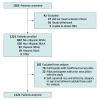Knowledge of Genome Sequencing and Trust in Medical Researchers Among Patients of Different Racial and Ethnic Groups With Idiopathic Dilated Cardiomyopathy
- PMID: 36383367
- PMCID: PMC9669924
- DOI: 10.1001/jamacardio.2022.4132
Knowledge of Genome Sequencing and Trust in Medical Researchers Among Patients of Different Racial and Ethnic Groups With Idiopathic Dilated Cardiomyopathy
Abstract
Importance: Cardiovascular disease contributes outsized mortality in patients from underrepresented racial and ethnic groups. Understanding levels of trust in medical researchers and knowledge of genome sequencing may help identify barriers to research participation and develop strategies to educate patients about the role of genetics in cardiovascular disease.
Objective: To assess racial and ethnic differences in trust in medical researchers and genome-sequencing knowledge among patients with idiopathic dilated cardiomyopathy and determine the association between trust in medical researchers and genome-sequencing knowledge.
Design, setting, and participants: This cross-sectional study conducted by a consortium of 25 US heart failure programs included patients with idiopathic dilated cardiomyopathy defined as left ventricular systolic dysfunction and left ventricular enlargement after excluding usual clinical causes. Enrollment occurred from June 7, 2016, to March 15, 2020.
Main outcomes and measures: Percent distributions, means, and associations of genome-sequencing knowledge scores and research trust scores for Hispanic, non-Hispanic Black (hereafter referred to as Black), and non-Hispanic White participants (hereafter referred to as White).
Results: Among 1121 participants, mean (SD) age was 51.6 (13.6) years with 41.4% Black, 8.5% Hispanic, and 43.4% female. After accounting for site effects, the level of genome-sequencing knowledge was lower in Hispanic and Black participants compared with White participants (mean score difference, -2.6; 95% CI, -3.9 to -1.2 and mean score difference, -2.9; 95% CI, -3.6 to -2.2, respectively). The level of trust in researchers was lowest in Black participants (mean score, 27.7), followed by Hispanic participants (mean score, 29.4) and White participants (mean score, 33.9). Racial and ethnic differences remained after adjusting for education, age at enrollment, duration of dilated cardiomyopathy, and health status. A higher level of trust was associated with a higher level of genome-sequencing knowledge within different racial and ethnic groups.
Conclusions and relevance: In this cross-sectional study, large racial and ethnic differences in levels of genome-sequencing knowledge and trust in medical researchers were observed among patients with dilated cardiomyopathy. Findings from this study can inform future studies that aim to enhance the uptake of genomic knowledge and level of trust in medical researchers.
Conflict of interest statement
Figures


Comment in
-
Equitable and Informed Consent in Genetic Studies.JAMA Cardiol. 2023 Jan 1;8(1):42-43. doi: 10.1001/jamacardio.2022.4142. JAMA Cardiol. 2023. PMID: 36383369 No abstract available.
References
-
- Mudd-Martin G, Cirino AL, Barcelona V, et al. ; American Heart Association Council on Genomic and Precision Medicine; Council on Cardiovascular and Stroke Nursing; and Council on Clinical Cardiology . Considerations for cardiovascular genetic and genomic research with marginalized racial and ethnic groups and indigenous peoples: a scientific statement from the American Heart Association. Circ Genom Precis Med. 2021;14(4):e000084. doi:10.1161/HCG.0000000000000084 - DOI - PubMed
Publication types
MeSH terms
Grants and funding
LinkOut - more resources
Full Text Sources
Medical

